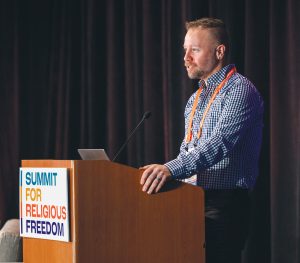
C&S: You envisioned and created SRF. How did that come about?
Silva: Before I arrived, the original idea for the event was more in line with a national gathering specifically for AU members and run by AU staff. However, I had also been asked to envision how this event could contribute to building up a national movement for church-state separation and inclusive religious freedom, as well as fight back against Christian Nationalism and others seeking to impose their narrow religious beliefs on others.
While AU is clearly a key leader in this space, I knew we needed to build a movement for everyone impacted by these issues whether they were AU members or not. So I proposed the Summit for Religious Freedom (SRF, like “surf”) as a space where any organization or person who believes in this work could find a home and work forward, together.
C&S: You led the coordination of SRF in its first three years to date. What does SRF mean to you personally, and how has SRF evolved thus far?
Silva: I am beyond proud of what the AU team has done to build SRF into what it is today. It’s an amazing feeling to take a vision, build it collectively and then see the positive impact and feedback we’ve received every year. Each year we’ve tried to grow and change in ways that build towards radical inclusion and staying just a little bit different. For example, we offer free virtual registration to any student with a “.edu” email address and are one of the few conferences that still offers full scholarships (registration, hotel and transportation) as well.
This year, we added a new half-day Organizing Institute based on the request from attendees for more hands-on skill training. And finally, we revamped our Hill Day experience in a way that both increased turnout and got our message in front of more Congressional staff (on both sides of the aisle) than ever before.
C&S: SRF is a “Big Tent.” Tell me more about what this means and why it is important in 2025 and beyond.
Silva: There’s a reason AU’s tagline is “freedom without favor, equality without exception” — church-state separation is the shield that protects that equality. The diversity of those who are advocates of our cause (whether they know it or not) span the spectrums of religion, age, gender, race, sexual orientation, belief and politics, as well as issues as diverse as reproductive freedom, LGBTQ+ rights, racial justice, public schools and democracy itself.
That diversity means we may not agree on all issues, and that is fine. A “Big Tent” means it’s a space where we can gather across difference to be curious respectfully, agree passionately, debate meaningfully, disagree without disrespect and learn as much as we teach. We are stronger remembering that we are united in our shared fight for inclusive religious freedom, church-state separation, and defeating white Christian Nationalism.
As one of our faith leaders said to me at SRF: “not always an ally, but not always an enemy.”